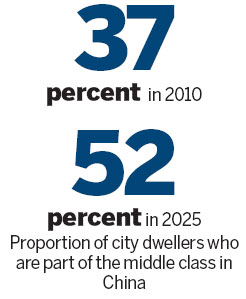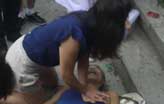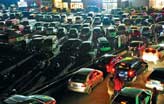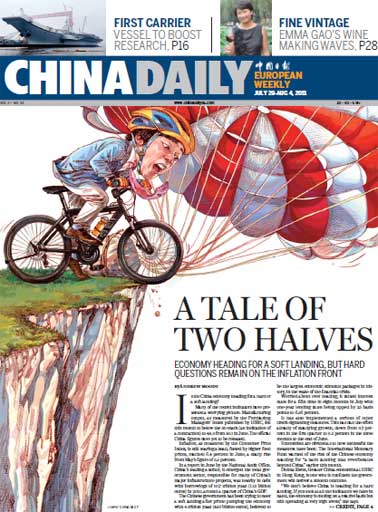Society
Middle class to dominate cities by 2023
Updated: 2011-08-04 08:01
By Chen Jia (China Daily)
BEIJING - Half of city dwellers in China will be part of the middle class by 2023, according to estimates from the country's think tanks.
Based on data from 2000 to 2009, researchers calculated that 37 percent of city dwellers were part of the middle class in 2010.
That percentage is expected to surpass 45 percent in 2019 and exceed 52 percent in 2025, said Zhang Lifeng, a researcher with the Chinese Academy of Social Sciences.
The annual report on the urban development of China, or Blue Book of Cities in China, was released by the Chinese Academy of Social Sciences on Wednesday. It defines the middle class by the amount of money a person spends on food as a percentage of total spending.

Song Yingchang, a colleague of Zhang at the Chinese Academy of Social Sciences' institute for urban and environment studies and the chief writer of the report, said the country's goal should be to have a graph of the country's incomes look like an olive - with a broad middle and tapering ends.
"We should be concerned about when the social income structure will take on that olive shape because we have the goal of building a moderately prosperous society," he told China Daily on Wednesday in Beijing.
"Differences in wealth should be reduced and a well-off society should be built. But we are facing uneven development between economic growth and citizens' living standards."
President Hu Jintao has pledged that incomes will be distributed in a reasonable and orderly manner, that most of the population will be in the middle class, and that absolute poverty will be essentially eliminated by 2020.
Zhang estimates in the report that the "olive shape" will appear in urban China after 2019, when the number of people making middle-class incomes will exceed the number making low incomes.
China is now home to about 50 million members of the urban poor, who make less than 8,500 yuan ($1,320) a year, said Jiang Guihuang, a teacher at Beijing City University.
That is twice the number of city dwellers who receive minimum living allowances from the government, Jiang said.
The government is taking various steps to combat poverty and reform the system used to distribute incomes, the report said.
Work is being done, for instance, to raise the incomes of those in the poorest group by gradually giving them more government aid and increasing the country's minimum wage. Elsewhere, steps are being taken to set up a mechanism to ensure employees at private business receive regular raises.
The report also called on the government to form more detailed plans on ways that better opportunities for education, employment, medical treatment and old-age care and housing can be offered to the public.
China Daily
(China Daily 08/04/2011 page3)
E-paper

Double vision
Prosperous Hangzhou banks on creative energies to bridge traditional and modern sectors
Minding matters
A touch of glass
No longer going by the book
Specials

Ancient plate broken
An ancient porcelain plate was accidentally destroyed during a research in the Palace Museum.

Selfless actions
A 20-year-old girl becomes an Internet star for giving her first kiss to a drowning old man.

Space race
Homebuyers are learning the hard facts of supply and demand: too many cars and too few parking spaces.
